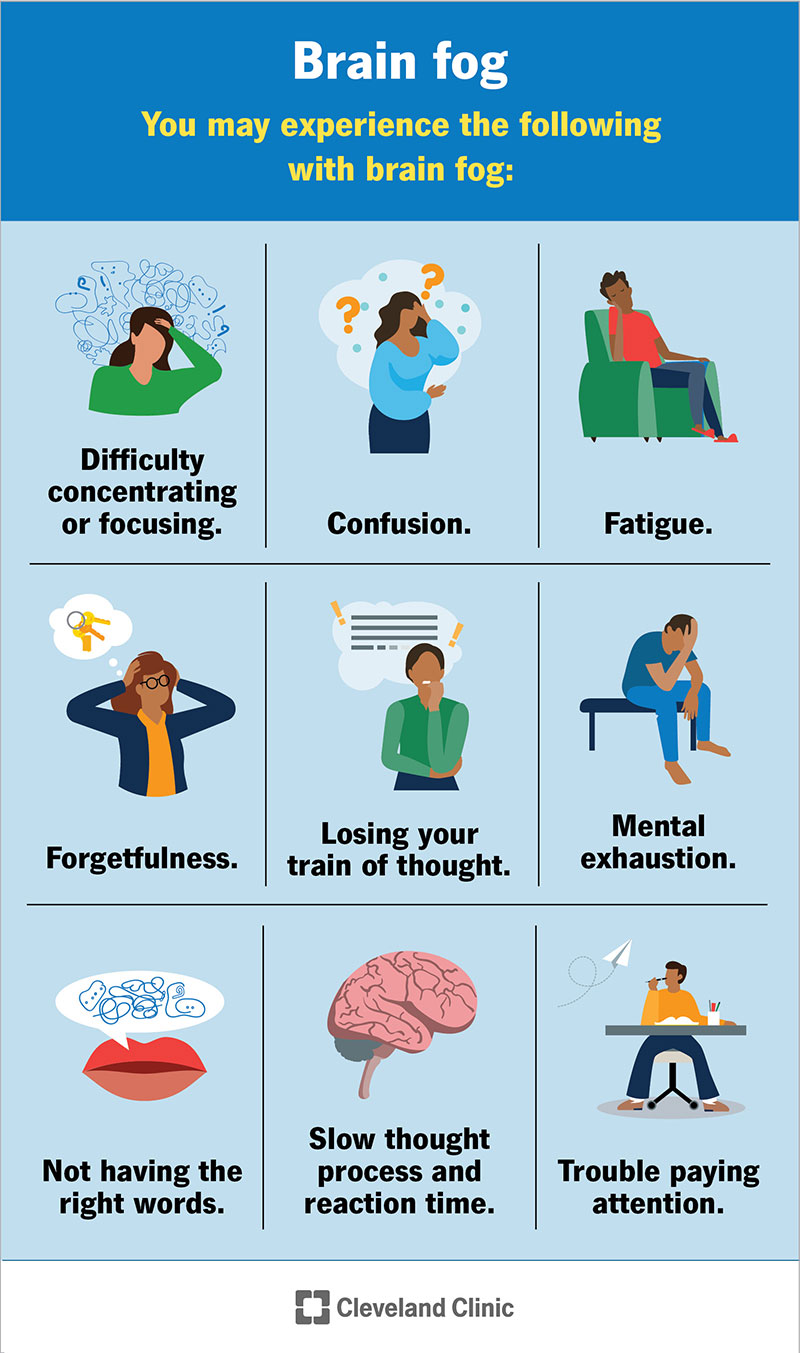Brain Fog: Definition, Symptoms, Causes, and Treatment Options
What is Brain Fog?
Imagine you’re trying to focus on a crucial task, but your mind feels like a thick fog is surrounding it, making it impossible to concentrate. You’re not alone in this experience. Millions of people worldwide suffer from a phenomenon known as brain fog, a common yet often misunderstood condition that affects mental clarity, memory, and cognitive function.
Brain fog, also referred to as mental fogginess or brain fatigue, is a subjective experience of impaired cognitive function, characterized by difficulty concentrating, memory lapses, confusion, and a general feeling of mental exhaustion. It’s like a mental haze that clouds your thinking, making everyday tasks feel overwhelming and mentally draining.
Research suggests that brain fog can be caused by a combination of factors, including:
- Chronic stress and anxiety: Ongoing stress and anxiety can impair the body’s ability to produce neurotransmitters, such as dopamine and serotonin, which regulate mood, motivation, and focus.
- Sleep deprivation: Lack of quality sleep or disrupted sleep patterns can affect the brain’s ability to clear waste and toxins, leading to impaired cognitive function.
- Nutritional deficiencies: Inadequate nutrition, particularly deficiencies in vitamins B12 and D, iron, and omega-3 fatty acids, can affect brain function and contribute to brain fog.
- Medical conditions: Certain medical conditions, such as hypothyroidism, anemia, and chronic fatigue syndrome, can cause brain fog symptoms.
- Medications: Some medications, including antidepressants and sedatives, can cause brain fog as a side effect.
- Hormonal changes: Hormonal fluctuations during menopause or pregnancy can lead to brain fog symptoms.
- Lifestyle factors: A sedentary lifestyle, excessive screen time, and lack of mental stimulation can contribute to brain fog.
In addition to these factors, some people may experience brain fog due to underlying neurological or psychiatric conditions, such as attention deficit hyperactivity disorder (ADHD), depression, or bipolar disorder.
Expanded Overview of Brain Fog
Are you tired of feeling like you’re stuck in a mental haze, struggling to focus and think clearly? You’re not alone. Brain fog, a condition characterized by persistent mental fogginess, confusion, and difficulty concentrating, affects millions of people worldwide. In this section, we’ll delve into the complexities of brain fog, exploring its causes, symptoms, and impacts on daily life.
Brain fog can manifest differently in different people, and its symptoms can vary in severity and duration. Common symptoms include:
- Difficulty concentrating and paying attention
- Memory lapses and forgetfulness
- Mental fatigue and exhaustion
- Confusion and disorientation
- Difficulty with word retrieval and language processing
- Decreased productivity and motivation
- Increased irritability and mood swings
Now that you know what brain fog is, it’s essential to recognize that it’s not a sign of laziness or lack of intelligence. Rather, it’s a legitimate condition that requires attention, understanding, and support.

Causes of Brain Fog
Imagine being stuck in a perpetual haze, where simple tasks like remembering appointments or concentrating on work seem like insurmountable challenges. For many of us, this is the harsh reality of brain fog. Below are some common culprits:
Medical Conditions
- Hypothyroidism: An underactive thyroid can impair cognitive function, leading to memory lapses and difficulty concentrating.
- Sleep Disorders: Chronic sleep deprivation or disorders like insomnia and sleep apnea can severely impact cognitive function.
- Anemia: Particularly iron-deficiency anemia, can lead to brain fog due to reduced oxygen delivery to brain cells.
Lifestyle Factors
- Poor Diet: A diet high in processed foods can disrupt gut function and impair cognitive health.
- Stress and Anxiety: Chronic stress can exhaust the brain’s energy stores, leading to mental fogginess.
- Dehydration: Mild dehydration can impair cognitive function, leading to symptoms of brain fog.
By understanding the causes of brain fog, we can take proactive steps to regain mental clarity. GoblinX offers a range of tools to support individuals dealing with anxiety and ADHD, which can be effective in managing brain fog symptoms.
Symptoms of Brain Fog
Brain fog is characterized by a range of symptoms that affect cognitive function, emotional well-being, and daily functioning. Physical symptoms may include:
- Persistent fatigue and low energy
- Headaches
- Digestive issues
Emotional symptoms often encompass mood swings and increased stress sensitivity. Cognitive symptoms can manifest as:
- Difficulty concentrating
- Memory loss
- Mental fogginess
Recognizing these symptoms is crucial, and incorporating tools offered by GoblinX may help alleviate these experiences.
Managing and Treating Brain Fog
If you’re struggling with brain fog, managing and treating it is possible. Some strategies include:
- Prioritize Sleep: Establish a consistent sleep schedule to help your brain function optimally.
- Exercise Regularly: Engage in physical activity to boost cognitive function.
- Nutrition: Focus on whole, nutrient-dense foods and stay hydrated.
For those interested in mindfulness practices, GoblinX provides tools that can assist in implementing these strategies effectively.
Related Terms and Conditions
Understanding brain fog involves recognizing its connection to other medical conditions, including:
- Chronic Fatigue Syndrome (CFS): This condition often includes brain fog as a prominent symptom.
- Fibromyalgia: Many individuals with fibromyalgia report experiencing brain fog.
To learn more and to utilize additional resources, visit the GoblinX Website.
Important Sources
| Brain Fog: What It Is, Causes, Symptoms & Treatment | Learn about the possible causes and how to manage brain fog with effective solutions. |
| Brain Fog: 6 Potential Causes - Healthline | Discover how to identify and treat brain fog effectively. |
| Brain Fog: Causes, How It Feels, Managing It - Verywell Health | Explore the myriad factors contributing to brain fog and management strategies. |